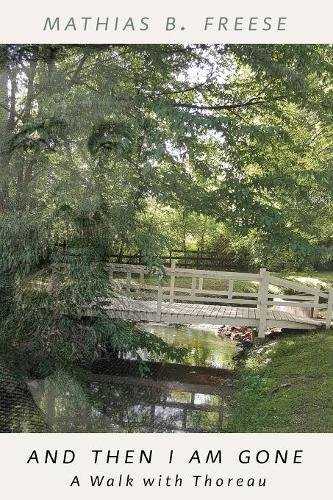 Reviewed by Jan Peregrine
Reviewed by Jan Peregrine
And Then I Am Gone: A Walk with Thoreau
by Mathias B. Freese
Wheatmark
Paperback: 126 pages, September 22, 2017, ISBN-13: 978-1627875387
Though I’m not a 76-year-old atheist of Jewish background (far from it), nor have I lived in urban New York, Nevada, or rural Alabama (the latter being the setting for his ‘latest philosophical musings) or appreciate Woody Allen’s deprecating humor, I feel a rather bittersweet kinship with Mathias B. Freese, author of And I Am Gone: A Walk With Thoreau. We share an understanding in many ways.
In the chaos of sharing a well-appointed cabin with his beloved, last wife, too often being irritated with home and Internet repair, increasing health concerns, and the unprofressionalism of hired labor, Freese describes his preferred style of being a professional, (retired) psychotherapist. While I’ve only created a psychoanalytic character mysteriously calling herself Dr. Freudine for over a decade, Freese and I believe in client-centered therapy where the therapist pays complete attention to his or her client and leaves notetaking until after the session ends. Such therapist puts down his overall, experiential-like impressions, which is what my Dr. Freudine did.
This is his second memoir, the first book of his I’ve read, and he expresses the hope that his invariably few readers may learn to see better, in an existential way.
I think Freese excels more in helping his readers to feel. As his own therapist has summed up Freese’s gift for humanity, to paraphrase, his therapeutic presence glories in being felt. He listens. He observes. Yes, he offers an ‘abundance of awareness.’
Not only do Freese and I concur on how a psychotherapist best engages with a client, but our approach to writing books also bisects. I too write to try to understand myself, indeed without outlines or a rigid plot structure. I daresay he would nod eagerly in understanding that your characters, given the chance, tell the story for you if you’ll listen to them, and in a more honest, exciting way.
You may call me an underground existentialist, Mr. Freese,. I see better through my fictitious characters’ eyes, and in the novel I’m writing the characters are struggling with their identities.
Other things in his book I can relate to include a profound disappointment and criticism of the shocking 2016 election for U.S. President (though he avoids praising Hillary Clinton, which I never would), an impatience and alienation with religion as I’m also an atheist, and a love of clever books and films.
I probably won’t face the specter of death for many decades, unlike Freese, and his preoccupation with death can be depressing. He has written an award-winning book about the Jewish Holocaust, but so many people today frustratingly choose to forget about the tragedy and to deny that they’ll one day die. I don’t deny that it happened or that I’ll die, but I wouldn’t care to read more about it. Maybe if I was much older, Jewish, and of a dark nature.
How I wish I too could walk in the woods as if with Henry David Thoreau!
Yes, you’re right that if an senior “at risk” citizen can do it, so could I, except that I must use a power scooter. Maybe you could for me, hmm?
Freese writes about not living for the answers to life, but living in the questions. He grieves that facing death, so largely about losing control of his life, is all that he’s left with in his cabin. Loving his wife and a visit by his son create some joy in his remaining days, but writing has become more elusive, even bewildering. Although he still hopes to write another reflective book.